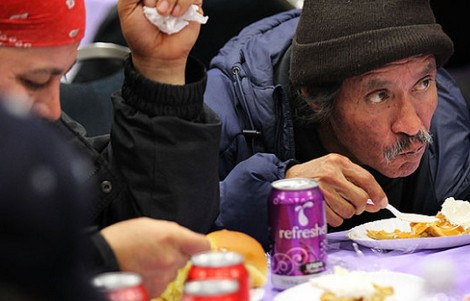WASHINGTON – Tensions between the rich and poor in the U.S. are increasing and at their most intense level in nearly a quarter-century, a new survey shows. Americans now see more social conflict over wealth inequality than over the hot-button topics of immigration, race relations and age.

The survey released Wednesday by the Pew Research Center highlights U.S. perceptions of the economic divide, an issue that has moved to the forefront in the 2012 presidential campaign amid stubbornly high unemployment, increasing poverty and protests by the Occupy movement.
The findings come as voters in New Hampshire’s primary Tuesday night made clear that the economy was the issue that mattered most to them. In the end, they chose Mitt Romney by a large margin, even as Republican rivals already gearing up for more competitive contests in South Carolina and elsewhere had stepped up populist attacks on him as a heartless corporate raider who slashed jobs.
President Barack Obama has been promoting a campaign message of middle-class opportunity, calling for higher taxes on the very rich and successfully pushing a two-month extension of a payroll tax cut.
The Pew survey shows that younger adults, Democrats and African-Americans remained the most likely as in previous years to cite the existence of strong disagreements between rich and poor. But in the last two years, three important swing groups — whites, middle-income Americans and political independents — registered some of the biggest increases in those who now also hold this view.
As a result, majorities of each political party and ideology all agree that serious disputes exist between Americans at the top and bottom of the economic ladder.
Still, while overall U.S. awareness of class conflict has grown significantly in recent years, public attitudes toward wealthy Americans remain largely unchanged.
For instance, about 46 percent of Americans hold a disapproving view that rich people are wealthy because they were fortunate enough to be born into money or have the right connections. But almost as many people — 43 percent — say wealthy people are rich “mainly because of their own hard work, ambition or education.”
That suggests some people who see more conflict between the classes may believe that anger toward the rich is misdirected.
Homeless children: The hard times generation
American angst and the plight of the 99%
Census data: Half of U.S. poor or low income
A recent Gallup survey also found that fewer than half of Americans said reducing the gap between rich and poor is “extremely” or “very important,” compared with more than 8 in 10 who said policies to build economic growth should be a high priority for government.
“These changes in attitudes over a relatively short period of time may reflect the income and wealth inequality message conveyed by Occupy Wall Street protesters across the country in late 2011 that led to a spike in media attention,” said Pew survey analyst Richard Morin. “But the changes also may reflect a growing public awareness of underlying shifts in the distribution of wealth in American society.”
In recent weeks, a slew of recent census data have illustrated a widening divide, including the share of overall U.S. wealth held by the top 10 percent of the population that increased from 49 percent in 2005 to 56 percent in 2009. A separate census measure also found that a record number of Americans — nearly 1 in 2 — have fallen into poverty or make earnings that typically classify them as low income.
“As the presidential campaign begins in earnest, it is reasonable to expect that these issues will be a part of the political dialogue,” Morin said.
About 3 in 10 Americans polled said there are “very strong” conflicts between the rich and poor, according to the independent research group. That is double the share who believed so in July 2009 and the largest proportion reporting that view in the 24 years the question has been asked in surveys.
In all, about 66 percent of those polled now say there are “very strong” or “strong” conflicts between the top and bottom income groups.
In contrast, a slightly smaller share of Americans — 62 percent — said there were “very strong” or “strong” conflicts between immigrants and native-born Americans. Even smaller shares of people saw such levels of conflict between blacks and whites (38 percent) and between young and old (34 percent).
That is a change from 2009, when immigration topped the survey list as causing the strongest levels of social conflict. At that time, about 55 percent reported “very strong” or “strong” conflict between immigrants and native-born Americans, compared to 47 percent who saw such conflict between the rich and poor.


